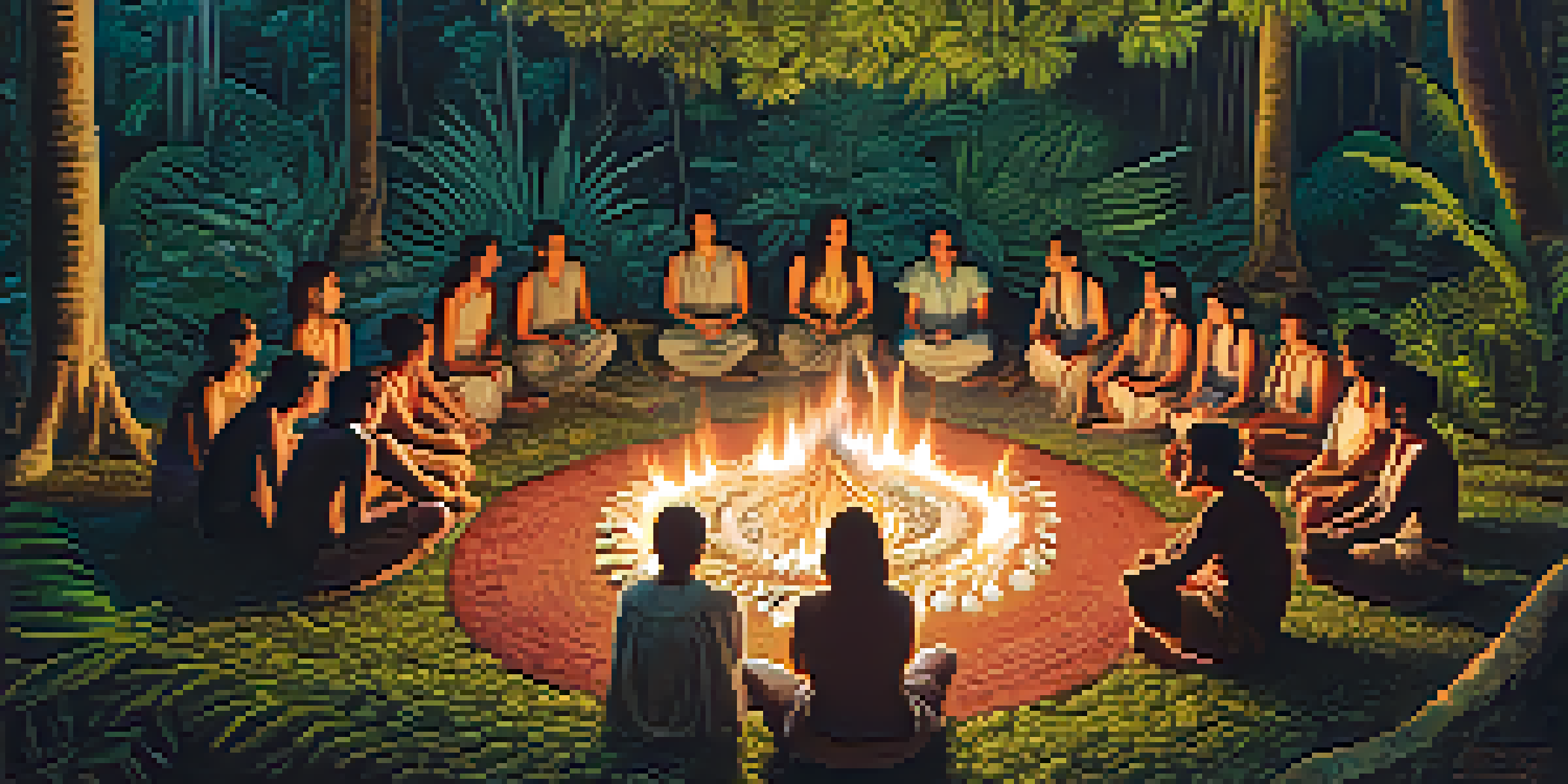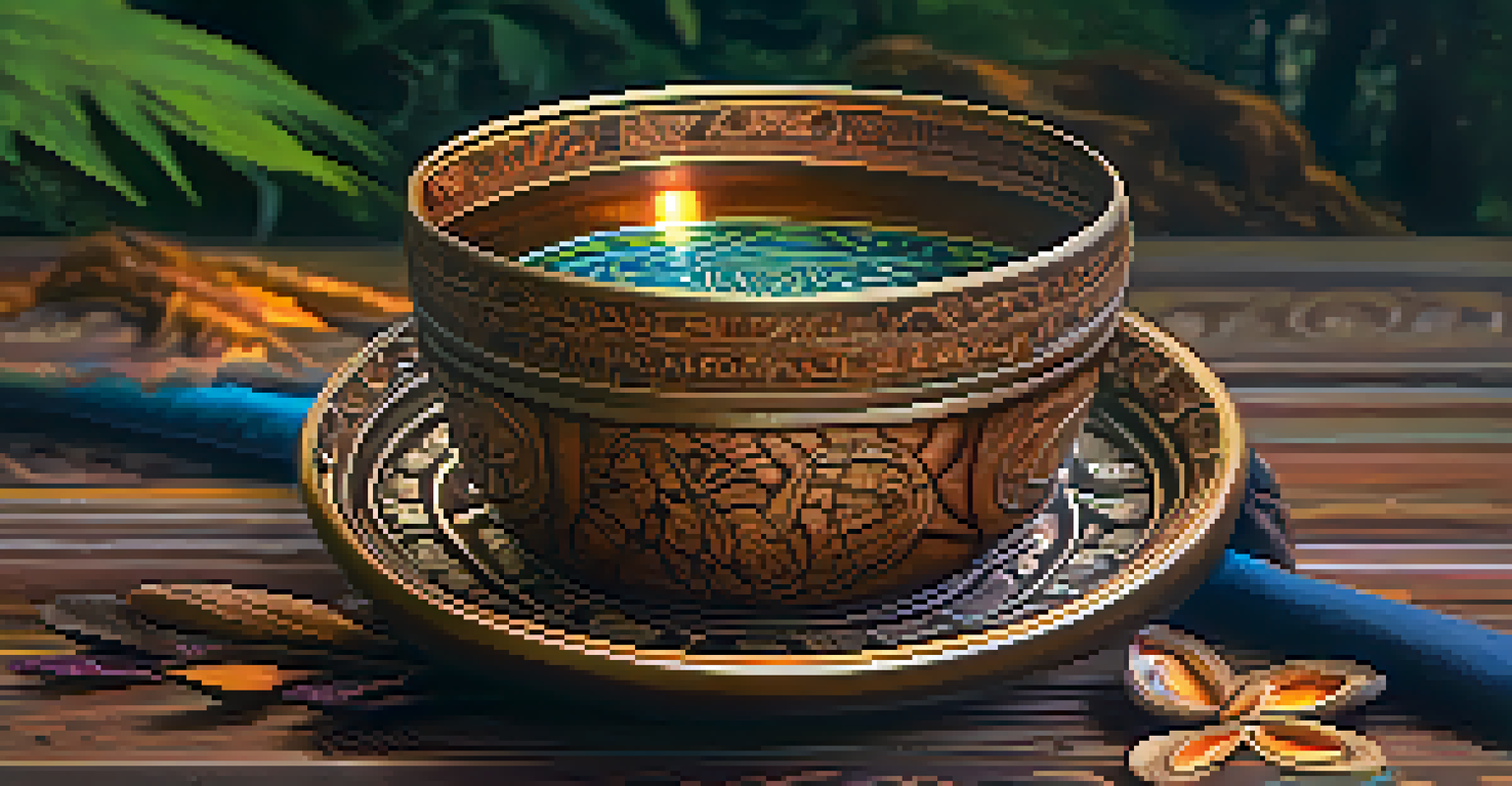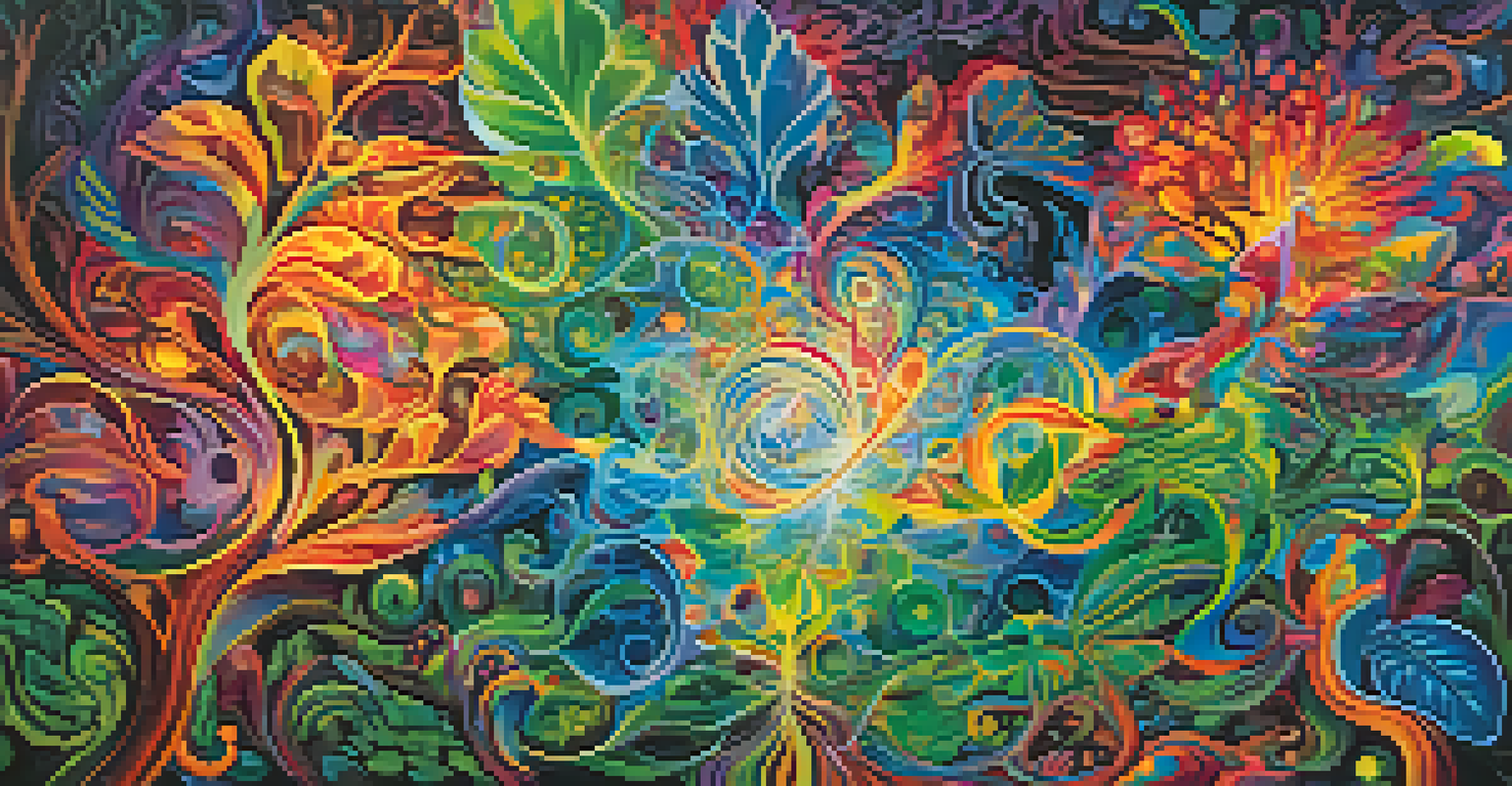The Influence of Western Spirituality on Ayahuasca Ceremonies

Understanding Ayahuasca: A Brief Overview
Ayahuasca is a traditional brew made from the Banisteriopsis caapi vine and other ingredients, often used by indigenous Amazonian tribes for spiritual healing. This potent concoction is known for inducing altered states of consciousness, leading to profound insights and emotional release. The ceremonies surrounding ayahuasca are deeply rooted in cultural practices that emphasize connection to nature, community, and the spirit world.
The spiritual journey is a personal journey, and each person's experience is unique to their own understanding and intentions.
In recent years, ayahuasca has gained popularity beyond its indigenous roots, attracting many Westerners seeking spiritual awakening or healing. This growing interest has led to an influx of tourists participating in ayahuasca retreats, which often blend traditional practices with modern spiritual beliefs. As a result, the essence of the ceremonies is evolving, merging ancient rituals with contemporary spiritual trends.
Understanding the original context of ayahuasca ceremonies is crucial to appreciating how Western spirituality influences their current practice. While the traditional aspects remain important, the integration of new perspectives can both enrich and complicate the experience for participants. This interplay raises questions about authenticity and the preservation of cultural heritage.
Western Spirituality: Trends and Influences
Western spirituality is often characterized by a blend of various philosophies, including New Age practices, mindfulness, and holistic healing. These trends emphasize personal growth, self-discovery, and a connection to the universe, appealing to those who feel disenchanted with traditional religious institutions. This shift has prompted many individuals to explore alternative spiritual paths, such as ayahuasca ceremonies, that promise transformative experiences.

The influence of Western spirituality is evident in how ayahuasca ceremonies are marketed and experienced. Many retreats now incorporate elements like guided meditations, yoga, and personal coaching, catering to a Western audience seeking a comprehensive spiritual journey. This adaptation not only makes the ceremonies more accessible but also shapes participants' expectations and experiences in profound ways.
Cultural Sensitivity in Ayahuasca
Understanding and respecting the indigenous roots of ayahuasca is crucial for preserving its spiritual essence in modern practices.
However, it's essential to recognize that this blending of traditions can lead to misunderstandings or misinterpretations of the original practices. Participants may approach ceremonies with preconceived notions influenced by their spiritual backgrounds, which can affect their receptivity to the experience. Navigating these diverse perspectives requires sensitivity and respect for the roots of ayahuasca traditions.
Cultural Exchange: Benefits and Challenges
The increasing interest in ayahuasca from Western seekers has sparked a cultural exchange that can be both enriching and challenging. On one hand, this exchange allows for a broader appreciation of indigenous practices, fostering a dialogue that can lead to mutual respect. For some indigenous communities, sharing their traditions can be empowering, providing opportunities for economic support through tourism.
To understand the culture is to understand the medicine, and to understand the medicine is to appreciate the culture.
On the other hand, this cultural exchange raises concerns about the commodification of sacred traditions. As ayahuasca retreats become business ventures, there’s a risk that the spiritual essence of the ceremonies may be diluted or misrepresented. This commercialization can lead to exploitative practices, where the focus shifts from genuine healing to profit-driven motives.
To navigate these challenges, it's crucial for participants to engage with retreats that honor the cultural significance of ayahuasca. By prioritizing authenticity and ethical practices, both Western seekers and indigenous practitioners can contribute to a more respectful and meaningful exchange. This balance is vital to preserving the integrity of ayahuasca ceremonies while allowing for cultural growth.
The Role of Intention in Ayahuasca Experiences
Intention plays a significant role in shaping the experience of ayahuasca ceremonies, both for indigenous participants and Western seekers. In traditional settings, participants often approach the ceremony with a clear purpose, whether it's healing, guidance, or spiritual growth. This focused mindset can enhance the depth of the experience, allowing individuals to connect more profoundly with the medicine and their inner selves.
For Western participants, intentions may vary widely, influenced by personal beliefs and spiritual backgrounds. While some come seeking profound insights, others may approach the experience more casually, viewing it as a novel adventure. This disparity in intentions can lead to vastly different experiences, highlighting the importance of aligning one's mindset with the ceremony's spiritual context.
Intention Shapes Ayahuasca Experiences
Setting clear intentions before participating in ayahuasca ceremonies can lead to more meaningful and transformative experiences.
Ultimately, setting a clear intention before participating in an ayahuasca ceremony can lead to a more fulfilling experience. It encourages self-reflection and mindfulness, helping participants navigate the emotional and spiritual landscapes they encounter. By fostering this intentional approach, both Western and indigenous participants can deepen their connection to the ceremony and its transformative potential.
The Intersection of Science and Spirituality
Recent years have witnessed a growing interest in the scientific exploration of ayahuasca and its effects on the mind and body. Researchers are studying the potential therapeutic benefits of ayahuasca for conditions like depression and PTSD, sparking a dialogue between science and spirituality. This intersection has led to a greater understanding of how ayahuasca can facilitate healing, particularly for Western participants seeking relief from psychological struggles.
However, the scientific approach to ayahuasca also raises questions about the commodification of the experience. While studies may validate its benefits, they can inadvertently reduce a deeply spiritual practice to mere data points. This reductionist view may overlook the rich cultural context within which ayahuasca is traditionally used, leading to a disconnection from its roots.
Balancing scientific inquiry with spiritual understanding is essential for preserving the integrity of ayahuasca ceremonies. By recognizing the value of both perspectives, participants can approach ayahuasca with a holistic mindset, appreciating its potential benefits while honoring its cultural significance. This balance fosters a more respectful and informed engagement with the practice.
Ethical Considerations in Ayahuasca Tourism
As ayahuasca tourism continues to grow, ethical considerations surrounding the practice have come to the forefront. Tourists seeking authentic experiences may inadvertently contribute to harmful practices, such as exploitation of indigenous communities and environmental degradation. It's crucial for participants to be aware of these issues and seek out retreats committed to ethical practices that respect local cultures and ecosystems.
One ethical concern is the potential for cultural appropriation, where Western participants adopt aspects of indigenous practices without understanding their significance. This can lead to a superficial engagement with the ceremonies, undermining the wisdom and teachings embedded in the traditions. To navigate this, participants should approach ayahuasca with humility and a willingness to learn from indigenous perspectives.
Ethics in Ayahuasca Tourism
Participants should prioritize ethical considerations to avoid exploitation and cultural appropriation in ayahuasca tourism.
By prioritizing ethical considerations, both travelers and retreat organizers can create a more sustainable model for ayahuasca tourism. This involves fostering genuine relationships with local communities, supporting conservation efforts, and promoting cultural sensitivity. Such practices not only enhance the experience for participants but also contribute to the preservation of the rich heritage surrounding ayahuasca.
Conclusion: A Path Forward for Ayahuasca Practices
The influence of Western spirituality on ayahuasca ceremonies presents both opportunities and challenges. As these practices evolve, it’s essential to honor the traditions from which they stem while integrating new perspectives that enrich the experience. By fostering a respectful dialogue between cultures, participants can contribute to the ongoing evolution of ayahuasca practices.
Moving forward, it’s vital for both Western seekers and indigenous practitioners to engage in a shared journey of learning and growth. This involves not only appreciating the spiritual and therapeutic aspects of ayahuasca but also recognizing the importance of cultural heritage and ethical practices. By doing so, the transformative potential of ayahuasca can be honored and preserved for future generations.

Ultimately, the journey with ayahuasca is deeply personal, and each participant’s experience will be shaped by their intentions, beliefs, and openness to the process. By approaching ayahuasca with respect and mindfulness, individuals can navigate this complex landscape of spirituality and culture, paving the way for a more harmonious and enriching experience.